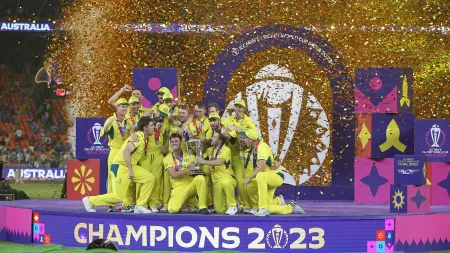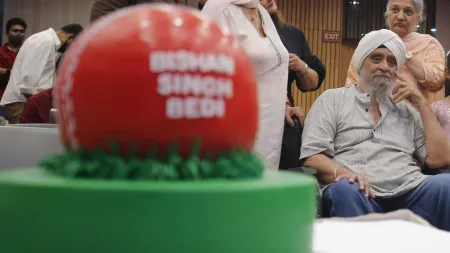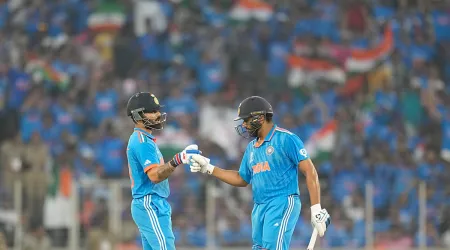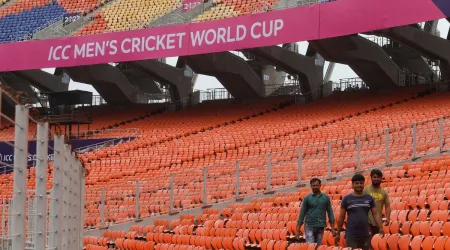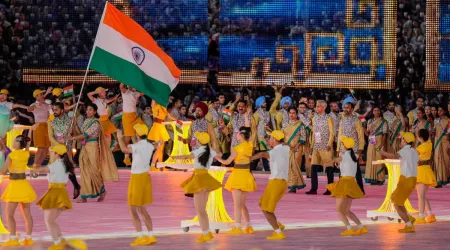- India
- International
Rajyavardhan Singh Rathore: The rise of Olympic silver medallist to India’s Sports Minister
For decades now, barring rare exceptions, the sport ministry has been viewed as punishment posting by politicians. Rajyavardhan Rathore, Olympic silver medallist, is set to become the first sportsperson to take the hot seat.
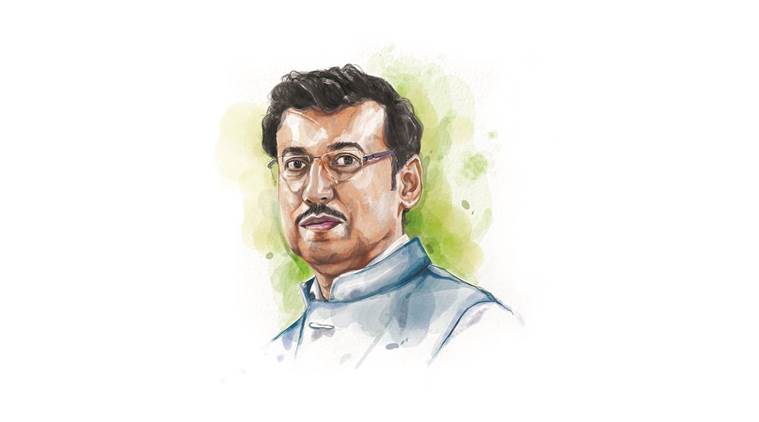 For the first time in 70 years, a sportsperson was named the country’s sports minister. (Illustration: Manali Ghosh)
For the first time in 70 years, a sportsperson was named the country’s sports minister. (Illustration: Manali Ghosh)
It’s the first Monday of September and the sleepy corridors of Shastri Bhawan are unusually busy. Situated in Delhi’s heart, this isn’t a particularly inspiring structure. If multilayer security checks don’t bug you, the monkey menace inside the complex just might. Most of the policy decisions are made inside this worn-out, Soviet-style building. The Ministry of External affairs, petroleum, women and child development, I&B are all housed here.
Scattered in the maze of concrete blocks are the offices of Sports Ministry. Unlike most other government departments, sport does not have a dedicated space. In these corridors, the importance of a Ministry is directly proportional to the kind of funding it receives. And sport, historically, has been an afterthought. In this year’s budget, the government earmarked a meager Rs 1,943 crore for Sport and Youth Affairs. Out of a total 56 ministries, 41 receive more funds than sports.
In most ministries, the arrival of a new minister is accompanied by a frenzy. But for sport, it has often been a low-key affair. However, there’s an unusual buzz today. For the first time in 70 years, a sportsperson was named the country’s sports minister. It’s an appointment that was applauded by most, opposition parties included.
‘#Rathore’ begins to trend on social media. As they wait for him to arrive, a ministry clerk is telling his junior colleague the story of their new boss. It’s about a counter-insurgency operation in Kashmir. “Goliyan uske jacket se paar hokar gayi, par use kuch nahi hua…” he gushes. (Bullets pierced through his jacket but nothing happened to him). Another official reminds anyone within his earshot about how his silver medal in Athens actually set the ball rolling for the rest of athletes.
Rathore walks in around half-past noon. He doesn’t blink; isn’t lost for words. He doesn’t mince them, either. “I remember the days when I used to wait at the reception just to enter this building,” he says, without a hint of sentiment. “My ministry will strive to ensure that athletes get sammaan and suvidha (respect and facility).”

It’s a shift from the past rhetoric where the ministers make vague promises on their first day at office. Many go on to finish their stint without actually understanding the scope of their job. On his first day, Vijay Goel had said: “I have just taken charge. It is difficult to list out my vision and priorities. Give me some time and I will speak about it.”
Sarbananda Sonowal, who headed the ministry before Goel, was no different. “Today is my first day. Some other day I will talk in detail about my future plan and action,” were his opening remarks. Rathore, instead, speaks eloquently about his plans. If politics is about perceptions, Rathore has hit bullseye with his first shot.
June 10, 2006. Rathore is doing one of those ‘Ask Me Anything’ sessions with a popular website. He is polite, non-committal in most of his replies. A user suggests he should act in movies. “I think you can do good job as a villain,” he tells the sporting hero, who is fresh from his Commonwealth Games gold. The chat meanders until a certain Kejriwal, not Arvind, asks for Rathore’s views on the country’s sports policy. Thrice before, he was prodded about his political ambitions. He ducked those questions. Not this time, though. “As important as any other policy,” Rathore replies.
He did not give away much. But Rathore barely has. He’s cagey and careful about his words. Around the same time, in an interview to Rajya Sabha TV, he felt that admitting his love for churma (a delicacy) was revealing too much about his private life.
Eleven years since that live chat, his ideologies haven’t changed much. Rathore takes over the sports ministry at a time when India’s preparation for the Tokyo Olympics is in shambles. The policy to fund athletes is still not finalized. The core group has not been identified. Shooters and wrestlers are underperforming, the hockey team isn’t stable while the dope figures continue to rise.
Rathore still hasn’t revealed what his ministry’s policy will be. Yet, when you skim through his past interviews, it’s easy to get a sense of his governance ideas. Funding has been the central theme throughout. In an interview in 2005, when talking specifically about shooters’ preparations for the Beijing Olympics, he had said identification of potential athletes and proper funding was essential. “You must (identify) those who are at the top international level, and who you feel have the potential and age to do well in three years’ time and thereafter. Give these select few people the funding that they need, have somebody responsible for producing results out of them,” Rathore had told rediff.com. “What I mean is that there should be a set of people who should be entirely coordinating with these top few about where they want to train, how they want to train, with whom they want to train, which competitions they must shoot as training and which competitions they must shoot to win.”
In another interview, he has suggested that the government should look at the lottery systems in the UK to generate more funds while also use sport as a medium to project ‘soft power’. He has spoken about the need to have better policies for national sports awards. There also happens to be an interesting blog of his where he has written extensively on the need to rescue sport from ‘administrative apathy and lethargy’.
A common theme has been inclusion of athletes in sporting bodies. “Consider this, you go for an emergency operation in a hospital and find the team about to operate on you is that of MBA’s — would you let them operate just because they partly administer the hospital?” he wrote. “The presence of sportspersons will provide the much-needed technical expertise while taking important decisions in the interest of the sport.”
For athletes, who have been wanting a say in sports administration for long, Rathore is their last hope. But they know change won’t be immediate. “People get very sentimental. Everybody expects he will join today and from next week, things will be better. It doesn’t happen that way,” Ronjan Singh Sodhi, a fellow double trap shooter, says. Morad Ali Khan, Rathore’s contemporary, says just one issue will decide whether his tenure as a sports minister is successful or not. “Sports legislation,” Khan says. “It’s been one issue since the time Rajiv Gandhi was the prime minister that no one has been able to achieve.”
A sports legislation, its backers believe, will weed out several issues faced by a sportsperson and will make for a healthier environment for them to thrive. There is no central legislation for sports in India, and its governance is covered under administrative laws, contract laws, intellectual property rights law and such. It’s run by various autonomous bodies that are mostly controlled by politicians. Let alone legislation, the sports ministry has not even been able to ensure that the Sports Code is universally adopted by all federations. The main reason for this has been the inability of the previous ministers to generate consensus since this will directly impact the politicians who have been ruling sports federations for years now.
Politicians do not like to admit it but getting the sports portfolio is seen as a slump in their political career. Many past ministers have used sports to stay visible, never missing a photo opportunity; others have waited for the tide to turn and jump the ship at the slightest hint.
Though, there have been a few who have tried to make a difference. Congress’ Ajay Maken showed the political will to take on the federations, ensured the athletes got the facilities they needed and also oversaw the preparations for the London Olympics, where India ended with a record six medals – although that was more because of hosting the CWG in 2010.
MS Gill’s tenure will forever be remembered as the man who asked Pullela Gopichand ‘who are you’ at a function his ministry organized to felicitate the badminton coach and Saina Nehwal. All the fights he picked up with the federations come distant second to this. Sunil Dutt had noble intentions but never was given the financial freedom to achieve things.
More recently, Sonowal used the ministry as a launchpad for his chief ministerial ambitions, which dearly cost India at the Rio Olympics. His successor Goel was industrious and accessible to athletes. But he lacked long-term vision and understanding to make sport’s machinery work. Both were often clueless about critical issues.
Former Indian Olympic Association secretary general Randhir Singh is one of the few sportspersons who was successful as an administrator as well. Rathore, he says, will need to carry everyone along to ensure work gets done. “Many of the politicians did not want to become the sports minister but they were handed a ministry so they hung on to it but they were always looking to go somewhere else,” Randhir, who presented Rathore the silver medal in Athens, says. “But for Rathore, being a sportsman, it gives him an advantage in the sense that he understands the demands. He can really do what a person who is a sportsman can do for his colleagues.”
Rathore can achieve a lot more also because, unlike in the past, the PMO has been directly involved in several policies. Sport, especially next month’s U-17 World Cup, has been a routine topic of discussion in Narendra Modi’s Mann Ki Baat. The prime minister has also shown interest in bringing major sporting events to India and has also been monitoring the preparations for Olympics first hand following the formation of the Task Force. The full charge of sports ministry is seen as a reward for Rathore’s work as a junior minister in the I&B. For once, it is viewed as promotion and not punishment.
He comes with some baggage, of course. The day he was appointed as the sports minister, Rathore’s son – Manavaditya – was competing at the junior shotgun world championship in Moscow. Manavaditya, coached by Rathore in his early years, has been gradually rising through the ranks in Indian shooting. With a top-ranked junior shooter at home, Rathore wouldn’t have to go too far to get a feedback about his ministry while he guards himself from the obvious allegations of favouritism.
The other aspect that will be keenly observed will be his relationship with the National Rifle Association of India (NRAI) and its president Raninder Singh. Rathore has largely refrained from commenting against the workings of either the sports ministry or federations. Except the NRAI. The federation has been accused of sabotaging his chances to qualify for the 2010 CWG and London Olympics by altering its selection policies.
A more damaging fight took place in 2013, when the NRAI allegedly stopped Rathore from contesting its elections for the post of president. Rathore dragged them to the Delhi High Court and managed to get a stay order. The spat got so ugly that the rival and current NRAI president Raninder Singh was accused of leaking the details of Rathore’s failed dope test in 2004.
The documents showed that Rathore failed a dope test just before the Athens Olympics. However, the International Shooting Sport Federation (ISSF) did not inform the International Olympic Committee and gave him the clean chit. Rathore has maintained innocence, saying he took ‘mild anti allergy treatments or antibiotic treatments for skin rashes’ but denies indulging in doping.
Doping is a dominant issue in Indian sport. But even today, more questions remain over the issue than the answers. Soon after this row with the NRAI, Rathore began his political journey with the BJP. Raninder, meanwhile, comes from a family of politicians, he is the son of Punjab’s Congress chief minister Amrinder Singh.
Raninder plays down those incidents, insisting they get along just fine. “Perceptions are not always correct,” Raninder says. “Things are sorted out between us. One meets socially. His son is shooting so we have been in touch that way. He also presented the silver medal I won at the National Championships.” But there’s sure to be some awkwardness when the realisation sinks in that the person they stopped from contesting elections four years ago is now the Sports Minister. The NRAI were among the first ones to congratulate Rathore on the appointment – a gesture they say proved that all is well. “He has transited in life. If there is one down, there are 10 ups as well. Rathore is now the national leader for sport. The NRAI is a small cog in the wheel for him,” Raninder says. Morad Ali Khan, too, insists Rathore isn’t naïve to let these personal differences come in the way of the bigger picture. “But he needs to watch his back,” Khan says.
Khan is talking in the larger context and not just the NRAI. If Rathore’s term is successful, the chorus to have more sportspersons in the federations, too, will gain momentum. The highly-politicized federations have blocked every attempt made by sportspersons to enter. “This, for them, is about survival. They will show support externally but Rathore will have to be careful,” Khan says.
His apprenticeship stint with I&B will hold him in good stead in understanding how the bureaucracy works and also in dealing with multiple agencies. So far, he has resisted the urge to make over-the-top claims or promise more positions for athletes in sports administration. His first aim, he says, is to ensure the focus is back on the athlete. “I know what hardships players have to face. The attitude of this ministry has to change,” he says. “My philosophy is simple: sammaan aur suvidha.”
Then and now:
Olympic preparation
What Rathore has said: “You must already have some who are at the top international level, and who you feel have the potential and age to do well in three years’ time and thereafter. Give these select few people the funding that they need, have somebody responsible for producing results out of them.”
— to rediff.com in 2005
What he inherits: The ministry is spending more than before. The process of releasing funds, though, has been criticised with the athletes claiming it is cumbersome. At the same time, athletes too have been accused of not planning properly and wasting the funds made available to them.
Policies
What Rathore has said: Sports are a part of any countries ‘soft power’ projection… We have to rescue sports from administrative apathy and lethargy…
— blogpost in 2011 in reference to the sports code
What he inherits: A National Sports Development Code was introduced in 2011 and then in 2013, which most federations adhere to at least in principle. It puts a cap on an office-bearer’s age and tenure, brings them under RTI and ensures overall transparency. However, a revised bill was drafted earlier this year on the lines of the reccomendations made by the Lodha panel in the BCCI case. That is stuck in the high court.
Sportspersons in administration
What Rathore has said: Consider this, you go for an emergency operation in a hospital and find the team about to operate on you is that of MBA’s; would you let them operate just because they partly administer the hospital. The presence of sportspersons will provide the much-needed technical expertise…
— from his blog in 2011
What he inherits: Administrators across federations have been around for ages and are generally reluctant to include sportspersons in federations, saying they lack the understanding. When asked about the same after becoming the sports minister, Rathore said: “Running any institution requires a mix of experience, in terms of sport, and management. I would look for people who are good managers and have heart of a sportsman.”




















